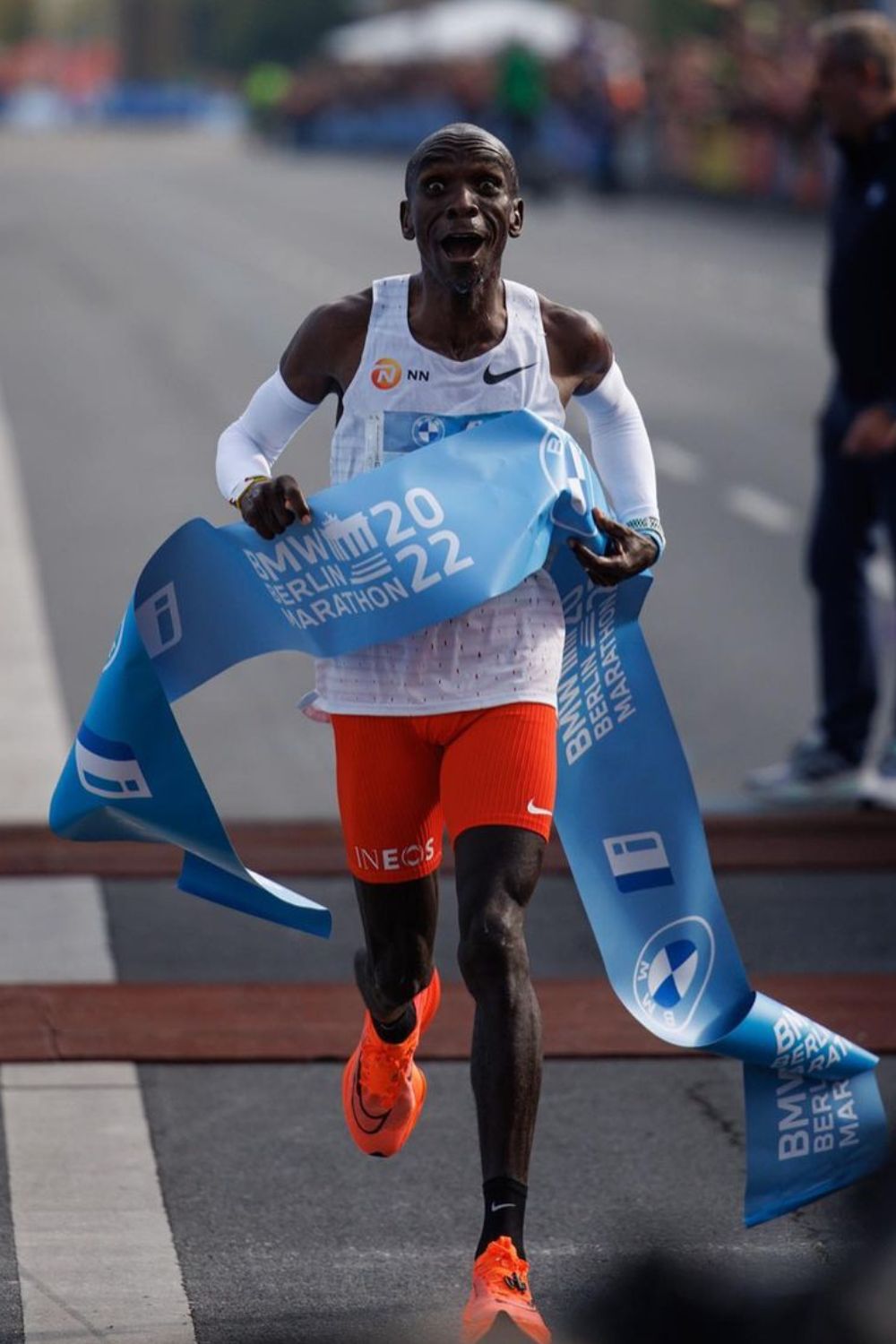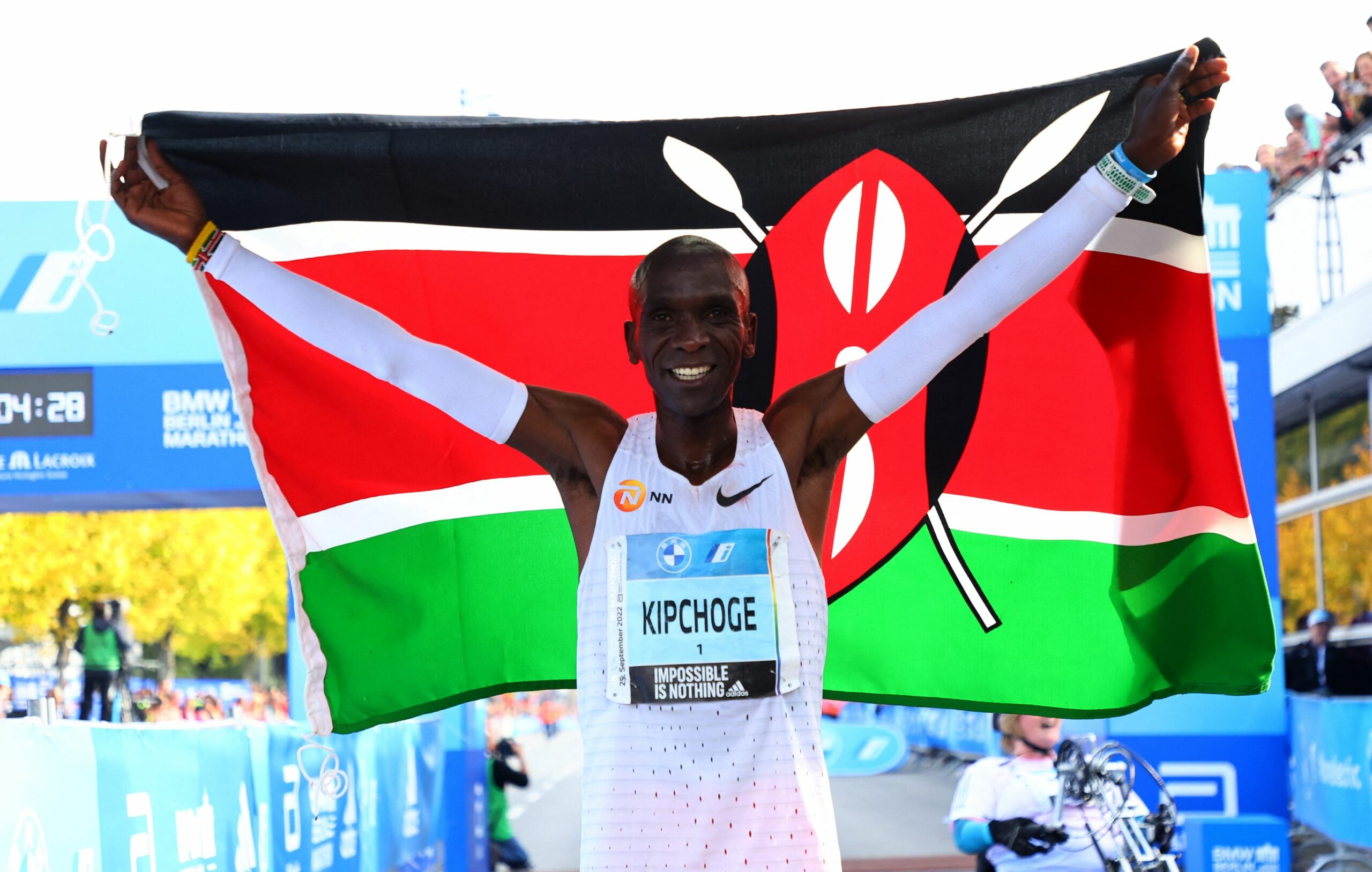Analyzing Eliud Kipchoge's Weight: The Impact On His Performance
When it comes to marathon legends, Eliud Kipchoge stands tall—or should we say, runs fast. His name alone sends shivers down the spines of competitors and admiration through the hearts of fans. But have you ever wondered how his weight plays a role in his extraordinary performance? Let's dive into this fascinating topic and uncover the secrets behind his success. So buckle up, because we’re about to break it down for you in a way that’ll make you go, “Wow, this guy’s legit on another level!”
Eliud Kipchoge is not just any runner; he's the king of marathons. His achievements are mind-blowing, and his ability to maintain such an incredible pace over long distances is nothing short of miraculous. But what role does his weight play in all of this? Is it a factor that contributes to his unmatched performance, or is it just one piece of the puzzle? We’ll explore these questions and more in this article.
Now, before we get into the nitty-gritty, let’s set the stage. Eliud’s journey from a young Kenyan runner to a global icon is a story of dedication, hard work, and passion. His weight has been a topic of interest for many, and understanding its impact on his performance can give us a deeper appreciation of his achievements. So, let’s lace up our running shoes and hit the ground running!
Read also:Unveiling The Enigma Diane Pol Ndash The Rising Star You Need To Know
Biography: Who is Eliud Kipchoge?
Before we dive into the specifics of analyzing Eliud Kipchoge's weight and its impact on his performance, let’s take a moment to appreciate the man behind the legend. Eliud Kipchoge, born on November 5, 1984, in Kapsabet, Kenya, is a name that resonates with greatness in the world of long-distance running.
Here’s a quick glance at his life and career:
| Full Name | Eliud Kipchoge |
|---|---|
| Date of Birth | November 5, 1984 |
| Place of Birth | Kapsabet, Kenya |
| Height | 5'7" (170 cm) |
| Weight | Approximately 54 kg (119 lbs) |
| Marathon Record | 2:01:09 (Berlin Marathon, 2018) |
Eliud’s journey to becoming the greatest marathon runner of all time wasn’t without its challenges. From his humble beginnings in rural Kenya to breaking world records, his story is one of perseverance and determination. Now, let’s shift our focus to the specifics of his weight and how it impacts his performance.
Understanding Eliud Kipchoge's Weight
Eliud Kipchoge’s weight is a crucial factor in his performance. Standing at 5’7” and weighing around 54 kg (119 lbs), Kipchoge’s physique is perfectly tailored for endurance running. But what makes this weight so significant? Let’s break it down.
First off, Kipchoge’s weight-to-height ratio is ideal for a marathon runner. This ratio allows him to maintain a high level of efficiency and endurance over long distances. His lean frame reduces the strain on his muscles and joints, enabling him to run faster and longer without fatigue setting in too quickly.
Now, here’s the kicker: Kipchoge’s weight isn’t just about being light. It’s about maintaining a balance between strength and agility. His training regimen ensures that he stays within a healthy weight range, which is crucial for his performance on race day.
Read also:Julia Mayorga The Rising Star Shining Bright In Hollywood
How Weight Affects Marathon Performance
When it comes to marathon running, weight plays a significant role in performance. Here are some key points to consider:
- Energy Efficiency: A lighter weight means less energy is required to move the body forward, allowing runners like Kipchoge to conserve energy over long distances.
- Reduced Strain: A lower body weight reduces the strain on muscles, joints, and ligaments, decreasing the risk of injury and fatigue.
- Aerodynamics: A leaner frame can improve aerodynamics, allowing runners to cut through the air more efficiently.
These factors combined make Eliud Kipchoge’s weight a key component of his success. But it’s not just about being light; it’s about being smart about weight management.
Weight Management: The Key to Success
Weight management is a critical aspect of Eliud Kipchoge’s training regimen. It’s not about crash diets or extreme measures; it’s about maintaining a healthy balance. Let’s take a closer look at how Kipchoge manages his weight to optimize his performance.
Kipchoge’s diet is carefully planned to ensure he gets the right nutrients to fuel his body for long-distance running. His meals are rich in carbohydrates, proteins, and healthy fats, providing him with the energy he needs to train and compete at the highest level.
In addition to his diet, Kipchoge’s training routine is designed to maintain his ideal weight. Regular workouts, including strength training and interval running, help him build endurance and strength without adding unnecessary bulk.
The Science Behind Weight and Performance
There’s a lot of science behind the relationship between weight and marathon performance. Studies have shown that a lower body weight can significantly improve running efficiency. For every kilogram of weight lost, runners can expect to see improvements in their speed and endurance.
However, it’s important to note that weight loss should be done safely and gradually. Extreme weight loss can have negative effects on performance and overall health. That’s why Kipchoge’s approach to weight management is so effective—he focuses on maintaining a healthy balance rather than chasing a specific number on the scale.
Impact of Weight on Eliud Kipchoge's Running Style
Eliud Kipchoge’s running style is as unique as his weight management strategy. His lightweight frame allows him to maintain a smooth, efficient stride that minimizes energy expenditure. This running style is a key factor in his ability to maintain a consistent pace over long distances.
Here are some key aspects of Kipchoge’s running style that are influenced by his weight:
- Stride Length: Kipchoge’s stride length is optimized for efficiency, allowing him to cover more ground with each step.
- Ground Contact Time: His lightweight frame reduces the time his feet are in contact with the ground, improving his overall speed.
- Energy Conservation: By maintaining a consistent pace and minimizing unnecessary movements, Kipchoge conserves energy for the final push.
These elements of his running style, combined with his weight management, make him one of the most efficient marathon runners in the world.
Comparing Eliud Kipchoge's Weight to Other Runners
When comparing Eliud Kipchoge’s weight to other marathon runners, it’s clear that he’s in a league of his own. While many runners focus on building muscle mass to improve strength, Kipchoge’s approach is different. He prioritizes efficiency over brute strength, and it shows in his results.
Studies have shown that runners with a lower body weight tend to perform better in marathons. This is because they can maintain a higher speed with less energy expenditure. Kipchoge’s weight gives him a significant advantage over his competitors, allowing him to push the limits of human endurance.
Statistical Evidence: The Numbers Don’t Lie
Let’s look at some statistics to back up this claim. According to a study published in the Journal of Sports Sciences, runners with a body mass index (BMI) below 20 tend to perform better in marathons. Eliud Kipchoge’s BMI falls well within this range, giving him a competitive edge.
Additionally, data from the Berlin Marathon, where Kipchoge set his world record, shows that his average pace was 2:56 minutes per kilometer. This incredible pace was made possible by his efficient running style and optimal weight.
Training Secrets: How Kipchoge Maintains His Weight
Now that we’ve explored the impact of weight on Eliud Kipchoge’s performance, let’s take a look at how he maintains his ideal weight. Kipchoge’s training regimen is as impressive as his race results. It’s a combination of disciplined workouts, a balanced diet, and a positive mindset.
Here are some of the key elements of Kipchoge’s training routine:
- Strength Training: Kipchoge incorporates strength training into his workouts to build muscle endurance without adding bulk.
- Interval Running: High-intensity interval training helps him improve his speed and stamina.
- Mental Preparation: Kipchoge places a strong emphasis on mental preparation, believing that a strong mind is just as important as a strong body.
These elements of his training routine, combined with a focus on maintaining a healthy weight, are the keys to his success.
Challenges and Obstacles: Overcoming Weight-Related Hurdles
While Eliud Kipchoge’s weight is a significant advantage, it’s not without its challenges. Maintaining a low body weight requires discipline and dedication, and there are times when it can be difficult to stay within the ideal range.
Here are some of the challenges Kipchoge faces in managing his weight:
- Injury Prevention: A lower body weight can increase the risk of injury if not managed properly. Kipchoge’s training regimen includes exercises to strengthen his muscles and joints.
- Nutritional Balance: Ensuring he gets the right nutrients while maintaining a low body weight is a constant challenge. Kipchoge’s diet is carefully planned to meet his nutritional needs.
- Mental Strength: Maintaining a healthy weight requires a strong mental attitude. Kipchoge’s positive mindset helps him overcome any obstacles he may face.
Despite these challenges, Kipchoge remains focused on his goals, proving that with the right mindset and training, anything is possible.
Conclusion: The Weight of Greatness
In conclusion, analyzing Eliud Kipchoge’s weight and its impact on his performance reveals a fascinating insight into the world of marathon running. His lightweight frame, combined with his disciplined training regimen, is a key factor in his success. But it’s not just about being light; it’s about maintaining a healthy balance that allows him to perform at his best.
As we’ve seen, weight management plays a crucial role in marathon performance. By understanding the science behind weight and running efficiency, we can appreciate the incredible achievements of athletes like Eliud Kipchoge. So, the next time you watch him break another record, remember that his weight is just one piece of the puzzle—but an important one nonetheless.
So, what do you think? Are you inspired to hit the trails and see how far you can push yourself? Share your thoughts in the comments below, and don’t forget to check out our other articles for more insights into the world of sports and fitness. Keep running, keep dreaming, and keep striving for greatness!
Table of Contents
- Biography: Who is Eliud Kipchoge?
- Understanding Eliud Kipchoge's Weight
- Weight Management: The Key to Success
- Impact of Weight on Eliud Kipchoge's Running Style
- Comparing Eliud Kipchoge's Weight to Other Runners
- Training Secrets: How Kipchoge Maintains His Weight
- Challenges and Obstacles: Overcoming Weight-Related Hurdles
- Conclusion: The Weight of Greatness


